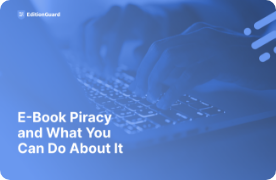eBook DRM officially stands for "eBook Digital Rights Management", and it is a term used to describe any technological method for fighting piracy so that the rights of musicians, software developers, and eBook authors can be protected.
How eBook DRM Protects Authors
DRM offers three levels of protection for authors of ebooks:
- It establishes a copyright for the contents of the ebook.
- It oversees and manages how the ebook is distributed.
- It manages and limits what the ebook owner can do with his or her ebook.


